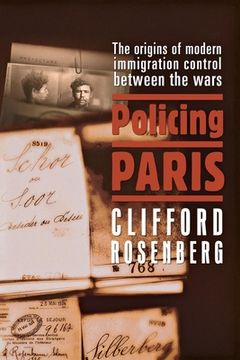Compartir
policing paris: the origins of modern immigration control between the wars (en Inglés)
Clifford D. Rosenberg
(Autor)
·
Cornell University Press
· Tapa Dura
policing paris: the origins of modern immigration control between the wars (en Inglés) - Rosenberg, Clifford D.
$ 145.418
$ 290.835
Ahorras: $ 145.418
Elige la lista en la que quieres agregar tu producto o crea una nueva lista
✓ Producto agregado correctamente a la lista de deseos.
Ir a Mis Listas
Origen: Estados Unidos
(Costos de importación incluídos en el precio)
Se enviará desde nuestra bodega entre el
Miércoles 05 de Junio y el
Miércoles 19 de Junio.
Lo recibirás en cualquier lugar de Argentina entre 1 y 3 días hábiles luego del envío.
Reseña del libro "policing paris: the origins of modern immigration control between the wars (en Inglés)"
The surveillance of immigrants and potential terrorists preoccupies leaders throughout the industrialized world. Yet these concerns are hardly new. Policing Paris examines a critical moment in the history of immigration control and political surveillance. Drawing on massive police archives and other materials, Clifford Rosenberg shows how in the years after the Great War the French police, terrified by the Bolshevik Revolution and the specter of immigrant criminality, became the first major force anywhere systematically to enforce distinctions of citizenship and national origins. As the French capital emerged as a haven for refugees, dissidents, and workers from throughout Europe and across the Mediterranean in the 1920s, police officers raided immigrant neighborhoods to scare illegal aliens into registering with authorities and arrested those whose papers were not in order. The police began to concentrate on colonial workers from North Africa, tracking these workers with a special police brigade and segregating them in their own hospital when they fell ill. Transformed by their enforcement, legal categories that had existed for hundreds of years began to matter as never before. They determined whether or not families could remain together and whether people could keep their jobs or were forced to flee. During World War II, identity controls marked out entire populations for physical destruction. The treatment of foreigners during the Third Republic, Rosenberg contends, shaped the subsequent treatment of Jews by Vichy. At the same time, however, he argues that the new methods of identification pioneered between the wars are more directly relevant to the present day. They created forms of inclusion and inequality that remain pervasive, as industrial welfare states around the world find themselves compelled to provide benefits to their own citizens and recruit foreign nationals to satisfy their labor needs.
- 0% (0)
- 0% (0)
- 0% (0)
- 0% (0)
- 0% (0)
Todos los libros de nuestro catálogo son Originales.
El libro está escrito en Inglés.
La encuadernación de esta edición es Tapa Dura.
✓ Producto agregado correctamente al carro, Ir a Pagar.

